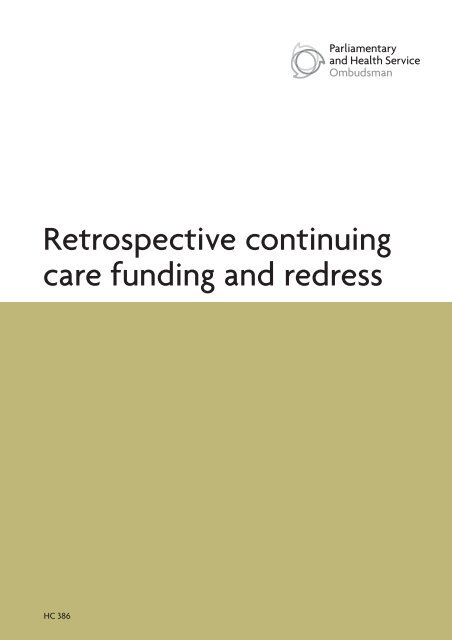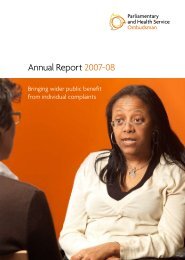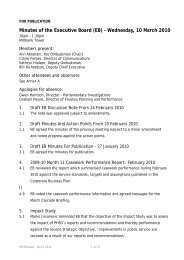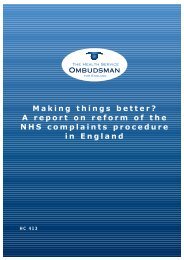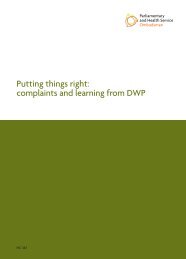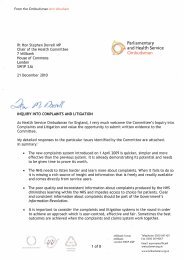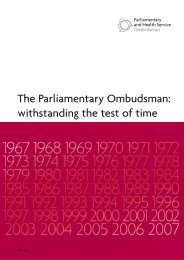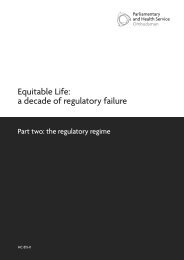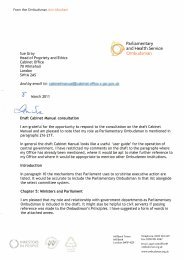Retrospective continuing care funding and redress report, March 2007
Retrospective continuing care funding and redress report, March 2007
Retrospective continuing care funding and redress report, March 2007
You also want an ePaper? Increase the reach of your titles
YUMPU automatically turns print PDFs into web optimized ePapers that Google loves.
<strong>Retrospective</strong><strong>continuing</strong> <strong>care</strong><strong>funding</strong> <strong>and</strong> <strong>redress</strong>3rd ReportSession 2006-<strong>2007</strong>Presented to Parliament pursuant toSection 10(4) of the ParliamentaryCommissioner Act 1967<strong>and</strong> Section 14(4) of the HealthService Commissioners Act 1993Ordered byThe House of Commonsto be printed on13 <strong>March</strong> <strong>2007</strong>HC 386London: The Stationery Office£7.50<strong>Retrospective</strong> <strong>continuing</strong> <strong>care</strong> <strong>funding</strong> <strong>and</strong> <strong>redress</strong> | <strong>March</strong> <strong>2007</strong> | 1
2 | <strong>Retrospective</strong> <strong>continuing</strong> <strong>care</strong> <strong>funding</strong> <strong>and</strong> <strong>redress</strong> | <strong>March</strong> <strong>2007</strong>
ForewordIn February 2003 <strong>and</strong> December 2004 in my role as Health ServiceOmbudsman for Engl<strong>and</strong>, I laid before Parliament two <strong>report</strong>sabout my investigations into complaints about <strong>funding</strong> for the<strong>continuing</strong> <strong>care</strong> of elderly <strong>and</strong> disabled people. The first of those,NHS <strong>funding</strong> for long term <strong>care</strong> (HC 399) made a number ofrecommendations to strategic health authorities (SHAs) <strong>and</strong>primary <strong>care</strong> trusts (PCTs). They included the recommendationsthat SHAs <strong>and</strong> PCTs should:• review the <strong>continuing</strong> <strong>care</strong> eligibility criteria used by theirpredecessor bodies, <strong>and</strong> the way those criteria had been applied,since 1996, taking into account the Coughlan judgment, guidanceissued by the Department of Health <strong>and</strong> my findings; <strong>and</strong>• make efforts to remedy any consequent financial injustice topatients, where the criteria, or the way they were applied, werenot clearly appropriate or fair. This would include attempting toidentify any patients in their area who may wrongly have beenmade to pay for their <strong>care</strong> in a home <strong>and</strong> making appropriaterecompense to them or their estates.As a consequence of the retrospective review of <strong>continuing</strong> <strong>care</strong>cases undertaken by the NHS when following theserecommendations, some people have now been grantedretrospective NHS <strong>funding</strong> for <strong>continuing</strong> <strong>care</strong>. While I am pleasedthat some people who had been wrongfully denied <strong>funding</strong> havenow received <strong>redress</strong> for the maladministration I identified, I havereceived a number of complaints about the amount of <strong>redress</strong>paid by primary <strong>care</strong> trusts.The complainants have alleged that the <strong>redress</strong> they receivedfailed to compensate them or their relatives fully for all thefinancial losses they suffered while having to fund essential longterm <strong>care</strong>.Primary <strong>care</strong> trusts have said that, in deciding on the amount ofcompensation for those who had been wrongly denied <strong>funding</strong> fortheir <strong>continuing</strong> <strong>care</strong>, they were following Department of Healthguidance.<strong>Retrospective</strong> <strong>continuing</strong> <strong>care</strong> <strong>funding</strong> <strong>and</strong> <strong>redress</strong> | <strong>March</strong> <strong>2007</strong> | 3
One of the complaints to me was made by Ms T following therefusal of Greenwich Teaching PCT to provide financial <strong>redress</strong> forthe premature sale of her uncle’s property. Ms T also complainedto me, via her MP, about the role of the Department’s guidance inthe PCT’s decision.PCTs are within my jurisdiction as Health Service Ombudsman forEngl<strong>and</strong> <strong>and</strong> the Department of Health is within my jurisdiction asParliamentary Ombudsman. Therefore, unusually, I issued a singleinvestigation <strong>report</strong> in relation to Ms T’s complaint. As I considerthat the issues raised will be of interest to Members generally, aswell as to professionals working in the fields of health <strong>and</strong> social<strong>care</strong>, voluntary organisations <strong>and</strong> advisers, I am laying this <strong>report</strong>before Parliament under section 10(4) of the ParliamentaryCommissioner Act 1967 <strong>and</strong> section 14(4) of the Health ServiceCommissioners Act 1993.Ann AbrahamParliamentary <strong>and</strong> Health Service Ombudsman<strong>March</strong> <strong>2007</strong>4 | <strong>Retrospective</strong> <strong>continuing</strong> <strong>care</strong> <strong>funding</strong> <strong>and</strong> <strong>redress</strong> | <strong>March</strong> <strong>2007</strong>
Joint <strong>report</strong> by the Parliamentary Commissioner forAdministration (Parliamentary Ombudsman) <strong>and</strong> the HealthService Ombudsman for Engl<strong>and</strong>SummaryThe Parliamentary Ombudsman found that there wasmaladministration in the Department of Health's decision making<strong>and</strong> communication of its approach to recompense for wronglydenied <strong>continuing</strong> <strong>care</strong> <strong>funding</strong>. The Department had advised theNHS to pay recompense based on the principle of restitution foronly those monies paid out in <strong>care</strong> fees. Their approachdiscouraged PCTs from considering full <strong>redress</strong>, including, forexample, <strong>redress</strong> for claimed financial loss for premature sale of aproperty or inconvenience <strong>and</strong> distress that individuals hadsuffered in making unnecessary difficult decisions about how tofund <strong>care</strong>. The Health Service Ombudsman concluded thatGreenwich Teaching Primary Care Trust had not acted withmaladministration <strong>and</strong> it was not responsible for theconsequences of its attempts to implement the Department'sunclear <strong>and</strong> inconsistent guidance to the NHS.The Department's maladministration resulted in inconsistency inpayments. However, for most people this is unlikely to haveresulted in significant unremedied injustice.The Parliamentary Ombudsman recommended that theDepartment should develop <strong>and</strong> distribute properly considerednational guidance for the NHS on <strong>continuing</strong> <strong>care</strong> <strong>redress</strong> whichaims to return individuals to the position they would have been inbut for the maladministration which wrongly denied them<strong>continuing</strong> <strong>care</strong> <strong>funding</strong>. The guidance should:a) include a reminder to the NHS that PCTs can makecompensation payments for:• financial loss, including interest, which isdemonstrably attributable to the wrongful denial of<strong>continuing</strong> <strong>care</strong> <strong>funding</strong> <strong>and</strong> is aimed at returningthe individual to the financial position he or shewould have been in but for the maladministration;<strong>and</strong>,• inconvenience <strong>and</strong> distress caused by having tomake difficult financial decisions at a challengingtime which were unnecessary because <strong>continuing</strong><strong>care</strong> should have been funded. Such paymentsshould recognise the degree of inconvenience <strong>and</strong><strong>Retrospective</strong> <strong>continuing</strong> <strong>care</strong> <strong>funding</strong> <strong>and</strong> <strong>redress</strong> | <strong>March</strong> <strong>2007</strong> | 5
distress that was suffered by complainants. In somecases this may be a significant sum of money, inothers a smaller sum. There will be cases where anysuch payments will be accounted for by thefinancial gain from unreclaimed state benefits<strong>and</strong>/or state pension payments;b) give clear guidance to the NHS about how tocalculate interest payments;<strong>and</strong> make it clear that, where inconsistencies in using theRetail Price Index have resulted in significant financialinjustice, adequate remedy should be made;c) include information for PCTs about the responsibilitiesof local authorities to offer deferred payment agreementsfrom October 2001, so that complaints can be promptlyconsidered by all the relevant bodies;.d) where, in the light of this guidance on <strong>continuing</strong> <strong>care</strong><strong>redress</strong>, PCTs identify systemic unremedied injustice, theDepartment should support them in taking action toremedy the injustice.The Department accepted the recommendation <strong>and</strong> agreed topublish such guidance.6 | <strong>Retrospective</strong> <strong>continuing</strong> <strong>care</strong> <strong>funding</strong> <strong>and</strong> <strong>redress</strong> | <strong>March</strong> <strong>2007</strong>
Introduction1. In February 2003 I presented to Parliament my first <strong>report</strong> onNHS <strong>funding</strong> for long term <strong>care</strong> (HC399). This <strong>report</strong>highlighted my concerns that individuals had suffered injusticeas a result of over-restrictive eligibility criteria for <strong>continuing</strong><strong>care</strong> <strong>funding</strong>. I concluded that weaknesses in the Department'sguidance on <strong>continuing</strong> <strong>care</strong> had contributed to the localdifficulties that I had identified. In response to one of myrecommendations the Department asked the NHS toinvestigate complaints of wrongful denial of <strong>continuing</strong> <strong>care</strong><strong>funding</strong> <strong>and</strong> remedy any identified injustice.2. Since February 2004 my Office has received <strong>and</strong> considered anumber of complaints about the <strong>redress</strong> paid by Primary CareTrusts (PCTs) as recognition of their maladministration inwrongfully denying NHS <strong>funding</strong> for the long term <strong>care</strong> ofsome elderly <strong>and</strong> dependent people. The complainants allegedthat the financial <strong>redress</strong> they had received from PCTs did notadequately compensate them for all the financial losses tothem or their relatives' estates, nor for the inconvenience <strong>and</strong>distress they <strong>and</strong> their relatives had suffered. In the course ofmy enquiries <strong>and</strong> investigations, PCTs told me that incompensating those who had been wrongly denied <strong>funding</strong> fortheir <strong>continuing</strong> <strong>care</strong>, they were following guidancedisseminated by the Department.3. One of these complaints was made by Ms T. Ms T complainedabout the role of the Department's guidance to the NHS in therefusal by Greenwich Teaching PCT to provide financial <strong>redress</strong>for the premature sale of her uncle's property. The backgroundto Ms T's complaint is set out in Annex A.4. In considering Ms T's complaint, I therefore took into accountthe actions of the Department in deciding on an approach toproviding recompense <strong>and</strong> in issuing guidance on that approachto the NHS. I have assessed the impact of this on GreenwichTeaching PCT as well as the impact on other PCTs across thecountry. Finally I considered whether the injustice arising fromthe <strong>continuing</strong> <strong>care</strong> <strong>funding</strong> maladministration I had identifiedwas adequately remedied.5. The matters raised by Ms T, <strong>and</strong> others, are within my remit asboth Parliamentary Ombudsman <strong>and</strong> Health Service<strong>Retrospective</strong> <strong>continuing</strong> <strong>care</strong> <strong>funding</strong> <strong>and</strong> <strong>redress</strong> | <strong>March</strong> <strong>2007</strong> | 7
Ombudsman for Engl<strong>and</strong> <strong>and</strong> there has been consultationwithin my Office on these points. In reaching a decision in myinvestigation of the Department as Parliamentary OmbudsmanI have taken account of relevant information obtained duringmy investigation of Ms T's complaint, which includes relevantinformation emerging from similar complaints about <strong>redress</strong>for <strong>continuing</strong> <strong>care</strong> <strong>funding</strong> maladministration made to me asHealth Service Ombudsman. Similarly, the findings of myinvestigation of the Department were relevant information forthe purposes of my investigation of <strong>and</strong> decision in Ms T'scomplaint about Greenwich Teaching PCT, <strong>and</strong> in other similarcomplaints made to me as Health Service Ombudsman aboutthe actions of PCTs.6. During the course of this investigation relevant documentswere obtained from a variety of sources <strong>and</strong> further evidencewas taken at interviews. This included a meeting between myinvestigators <strong>and</strong> Department officials in February 2005 todiscuss the question of <strong>redress</strong> for maladministration inconnection with <strong>continuing</strong> <strong>care</strong> <strong>funding</strong>. I have not included inthis <strong>report</strong> every detail investigated, but I am satisfied that nomatter of significance has been overlooked.8 | <strong>Retrospective</strong> <strong>continuing</strong> <strong>care</strong> <strong>funding</strong> <strong>and</strong> <strong>redress</strong> | <strong>March</strong> <strong>2007</strong>
The investigation of theDepartment by theParliamentary OmbudsmanThe basis for the Department's approach onrecompense7. By late April 2003, in response to my first<strong>report</strong> as Health Service Ombudsman for Engl<strong>and</strong>on NHS <strong>funding</strong> of long term <strong>care</strong> (HC399), theDepartment had agreed that the NHS shouldmake recompense to those wrongly denied<strong>continuing</strong> <strong>care</strong> <strong>funding</strong>. The Department haddecided that the basis of this recompense shouldbe restitution. In this instance the Departmentdecided that restitution meant reversing the'false enrichment' of the NHS; that is, that theNHS would pay back the money it had gained bynot paying <strong>care</strong> fees which should have fallen tothe NHS's budget.8. The Department's explanation for theirapproach of restitution was that the relevantpolicy team 1 considered it would be:• what an individual would get if they tookcourt action against the NHS <strong>and</strong> won;• consistently applied by the NHS <strong>and</strong>,therefore, fair <strong>and</strong> equitable;• relatively quick <strong>and</strong> easy to administer;• in keeping with the need for proper <strong>care</strong> <strong>and</strong>use of public funds; <strong>and</strong>• in line with Ministers opinions.9. The Department said that they felt undersignificant pressure from my Office to rectify thesituation quickly <strong>and</strong> get the retrospective reviewprocess under way. In coming to a decision aboutrestitution, precise details of the basis ofindividual payments had not been discussed withthe NHS; at that stage the NHS was simply toldthat recompense would be due if it was acceptedthat someone had been wrongly denied<strong>continuing</strong> <strong>care</strong> <strong>funding</strong>.10. The Department decided that an alternativeapproach to restitution, such as compensationfor financial loss other than fees, would be tootime-consuming <strong>and</strong> potentially too intrusive forcomplainants. This was because they thought itmight involve the NHS in making detailed <strong>and</strong>complex assessments of individual financialcircumstances <strong>and</strong> they were aware that the NHSwas not used to making such assessments. Also,they said they wanted to avoid making judgmentsabout the decisions people had made about howto raise the money to pay for fees. They believedthat in most cases there would be no strongcausal link between the NHS's denial of<strong>continuing</strong> <strong>care</strong> <strong>funding</strong> <strong>and</strong> the individualdecisions people had made. They considered thatthe principle of restitution would achieveconsistency for all complainants, whereas analternative system based on those personaldecisions <strong>and</strong> the ability of individuals to prove acausal link would not.11. The Department's policy team haveacknowledged that when they made the decisionon restitution they were unaware of HM TreasuryGuidance in 'Government Accounting 2000' (GA2000), which includes the guidance for centralgovernment departments on financial <strong>redress</strong> toremedy the consequences of maladministration.They were, therefore, unaware that GA 2000includes principles about <strong>redress</strong>; to aim to returnindividuals to the financial position they wouldhave been in but for the maladministration onthe part of the public body. However, in1. Continuing Care <strong>and</strong> Delayed Transfers of Care<strong>Retrospective</strong> <strong>continuing</strong> <strong>care</strong> <strong>funding</strong> <strong>and</strong> <strong>redress</strong> | <strong>March</strong> <strong>2007</strong> | 9
esponse to my investigation, the Departmentsaid that, in their opinion, the principle on whichtheir restitution policy was based could beconsidered to be in line with GA 2000, whenconsidered in hindsight. The Department alsotold my staff that the GA 2000 section on<strong>redress</strong>, although applicable to the Departmentitself, was not applicable to the NHS, which wasneither a central government department nor anon departmental public body.The Department's provision of guidance to the NHS12. In April 2003 the Department issued adviceto Strategic Health Authorities (SHAs) oncalculating potential recompense costs: the'national methodology on estimating <strong>continuing</strong><strong>care</strong> provisions'. This was the first formal writtencommunication to the NHS with respect tofinancial calculations for recompense. During myinvestigation, the Department said that thisguidance was intended for NHS financemanagers; it advised them how to prepareestimates of the anticipated total cost ofrecompense. This document also provided advicethat the NHS should not adjust recompensepayments to take account of an individual's levelof benefit income or any social services' meanstesting, even when these had arisen because ofthe decision not to award NHS <strong>funding</strong> for<strong>continuing</strong> <strong>care</strong>. The basis for this advice wasthat: 'The payments are restitutionary claimsbased on the fact that the NHS body has beenunjustly enriched. The NHS pays what it wouldhave paid (i.e. the full costs).' The Departmentsuggested in this guidance to SHAs that provisionbe made for payments of interest on recompenseat the Bank of Engl<strong>and</strong> base rate in operation foreach relevant financial year, given that theDepartment's legal advice had indicated that theNHS may be expected to pay interest on<strong>continuing</strong> <strong>care</strong> recompense. SHAs were alsoadvised through this document that furtherguidance on whether <strong>and</strong> how much interestshould be paid on claims was being developed bythe Department. The Department have sinceclarified to my staff that the use of the Bank ofEngl<strong>and</strong> base rate for interest calculations whenestimating the anticipated cost of recompensewas to ensure that these estimates providedflexibility for calculating individual payments inthe future.13. From then on, the principle of correcting thefalse enrichment of the NHS was alsocommunicated at regular meetings between theDepartment <strong>and</strong> SHA Older People's Serviceleads <strong>and</strong> in response to specific queries from theNHS by telephone <strong>and</strong> email. For example, in May2004 the Department's Continuing Care Leademailed a SHA Finance Director in response to aquery about restitution, advising 'reimbursement(restitution) is for unjust enrichment ie of theNHS for the cost of <strong>care</strong> denied. So we pay outfor <strong>care</strong> costs (+ interest) but not anything else'.14. No further written guidance on theprinciples of restitution was issued, nor was thereany reference to the existing powers of PCTs tomake compensation payments in respect ofactual financial loss, inconvenience <strong>and</strong> distress.When my staff raised this with the Departmentthey maintained that PCTs knew about theirexisting powers <strong>and</strong> there had been no need toremind them. However, investigation of thecomplaints I have received shows that this wasinitially not clear to all PCTs. Also, PCTs werereluctant to exercise these powers, which theyinterpreted as being against the Department'sguidance. In response to complainants, PCTsindicated that they did not have the power to actin contravention of the Department's guidance.15. Furthermore, the provision of additionalresources for recompense had been calculated onthe basis of restitution payments only. During myinvestigation, the Department explained that atthe end of the financial year 2002/2003, £25010 | <strong>Retrospective</strong> <strong>continuing</strong> <strong>care</strong> <strong>funding</strong> <strong>and</strong> <strong>redress</strong> | <strong>March</strong> <strong>2007</strong>
million was added to the NHS's nationalallocation in recognition of the additionalfinancial pressure that would be created byrecompense for retrospective <strong>continuing</strong> <strong>care</strong><strong>funding</strong>. Each PCT was asked to estimate thetotal costs of recompense in their area, using theDepartment's guidance issued in April 2003.These estimates were refined during the financialyear 2003/2004; resulting in an estimate ofapproximately £187 million when PCTs' end ofyear financial accounts were finalised in April2004. The additional <strong>funding</strong> was not ring-fencedsolely for <strong>continuing</strong> <strong>care</strong> <strong>funding</strong> - this is notunusual for the allocation of <strong>funding</strong> to the NHS- it was for each PCT to manage its own spend on<strong>continuing</strong> <strong>care</strong> recompense within its agreedallocation of <strong>funding</strong>. The Department made itclear to the NHS that all recompense paymentswere to be managed within the agreed provision<strong>and</strong> any additional payments would need to befound from existing PCT budgets.Final guidance on interest rates16. In November 2003, the Department issued'Continuing Care guidance on interest payments'to the NHS. They advised that, subject to locallegal advice, the NHS should include interestbased on the Retail Price Index (RPI) when payingrecompense. This developed their earlier adviceof April 2003 to NHS finance managers: 'the NHSmay be expected to pay interest on claims.Further advice is being developed…..it may beappropriate for NHS bodies to make provisionfor interest based on the base rate in operationfor each financial year affected.' TheDepartment have since clarified to my staff thatthe April 2003 guidance on estimating provisionswas not intended to give advice to the NHSabout interest for individual payments. In thecourse of my investigation, the Departmentprovided the formula that they had expected theNHS would use to calculate RPI as a simple rateof interest. The Department clarified that theyexpected that PCTs should satisfy themselvesthat their method of calculation had a minimalfinancial impact on the final value ofrecompense <strong>and</strong> that if the impact wassignificant PCTs might use the more complexformulas to calculate compound interest.17. The November 2003 guidance on interestrates did not include the Department's rationalefor advising the NHS to use the RPI <strong>and</strong> I haveseen no evidence that this was provided in anysubsequent communication with SHAs <strong>and</strong> PCTs.Further, in the complaints put to me, therationale for, <strong>and</strong> in some case an explanation ofhow, the RPI had been applied was notcommunicated by PCTs to individuals when itwas used to uplift restitution payments.18. In January 2004 a SHA queried theDepartment's November 2003 guidance oninterest payments. They asked whether a higherrate than the RPI might be appropriate <strong>and</strong> howto respond to complainants on this point. Inresponse, the Department's Continuing Care Leadwrote 'The answer is don't draw attention to it<strong>and</strong> say Department has issued guidance oninterest…The explanation is that recompensemeans restitution of the actual cost of NHS<strong>continuing</strong> <strong>care</strong> that should have beenprovided…so recompense is of the funds notproperly provided, not what the individual mighthave paid….The recompense therefore covers thecost of services not provided. This is the systembeing used across the country, <strong>and</strong> money hasbeen made available to the NHS to support this'(by email dated 16 January 2004). This responsedid not explain why the Department decided toadvise the use of the RPI, or that this decisionshould be subject to local legal advice.19. In the course of my investigation, theDepartment subsequently provided to my stafftwo explanations for the use of the RPI. The firstreason the Department gave was that the RPI was<strong>Retrospective</strong> <strong>continuing</strong> <strong>care</strong> <strong>funding</strong> <strong>and</strong> <strong>redress</strong> | <strong>March</strong> <strong>2007</strong> | 11
widely used by the NHS to measure increases inthe cost of <strong>care</strong>. They said that they hadreasoned that the NHS's experience in makingsuch calculations based on a RPI formula wouldmake it the most straightforward method forthem to use when calculating interest for<strong>continuing</strong> <strong>care</strong> recompense payments. A secondreason given by the Department was that theywished to avoid overcompensating individualsbecause some individuals, when they werewrongly denied <strong>continuing</strong> <strong>care</strong> <strong>funding</strong>, receivedbenefits they would not otherwise have beenentitled to. The Department, therefore, contendthat the retention of these benefits, combinedwith the use of the RPI, was equivalent to the useof a higher rate of interest.Status of the Department's guidance20. The Department's initial response to myenquiries was that the guidance they gave to theNHS was 'general advice'. They added that 'thiswas, however, a framework <strong>and</strong> did not preventother solutions in exceptional cases. PCTsretained the power to exercise discretion inindividual cases'. During my investigation, theDepartment added that they had beenconstrained in the amount of formal guidancethat they could give the NHS by the principlesoutlined in 'Shifting the Balance of Power withinthe NHS' (Department of Health, July 2001).21. The Department explained that before'Shifting the Balance of Power', the prevailingculture in the Department <strong>and</strong> in the NHScreated an expectation that the Departmentwould provide prescriptive guidance in all areasof policy. The subsequent devolution of power<strong>and</strong> decision making to local NHS organisationsmeant that it was no longer the Department'srole to give that same level of direction. TheDepartment considered that they could not beprescriptive in their guidance to the NHS about<strong>continuing</strong> <strong>care</strong> recompense. The Departmentfelt that the shift in culture <strong>and</strong> the redefinitionof their relationship with the NHS may havecreated some uncertainty amongst health servicebodies as to the status of their guidance <strong>and</strong>advice. The Department told my staff that theguidance documents they had provided to theNHS in April <strong>and</strong> November 2003 were inresponse to queries they had received from SHAs<strong>and</strong> PCTs by email <strong>and</strong> at meetings about how tocalculate recompense.22. The Department reached a nationalagreement with the Department for Work <strong>and</strong>Pensions that social security benefits would notbe reclaimed from individuals whereoverpayments had been made. In their April 2003guidance, the Department told the NHS not toadjust for these payments in estimating totalrecompense. In November 2003, in response toqueries about whether to take benefits intoaccount when making recompense, theDepartment told SHA Older People's leads attheir regular meeting that 'social security benefitsshould not under any circumstances be deductedfrom the total amount of compensation'. This wastherefore a prescriptive approach in relation tothe treatment of social security benefits. TheDepartment went on to clarify at this meetingthat interest could be paid to individuals at SHAs'discretion. The document issued by theDepartment that month stated that it gave'guidance as to the suggested methodology forthe application of interest', adding that PCTsshould take their own legal advice about this <strong>and</strong>payment of interest was discretionary.12 | <strong>Retrospective</strong> <strong>continuing</strong> <strong>care</strong> <strong>funding</strong> <strong>and</strong> <strong>redress</strong> | <strong>March</strong> <strong>2007</strong>
Findings of the ParliamentaryOmbudsman23. I will now consider in turn whethermaladministration occurred <strong>and</strong> the impact ofany maladministration. When deciding if therewas maladministration I considered what was therecognised approach to <strong>redress</strong> at the time of theDepartment's decision about recompense. TheDepartment did not have principles of <strong>redress</strong> forthe NHS but, as a central governmentdepartment, were themselves subject to GA2000, which includes that: 'the general principleshould be to provide <strong>redress</strong> which is fair <strong>and</strong>reasonable in the light of all the facts <strong>and</strong>circumstances of the case. Where thecomplainant has suffered actual financial loss asa result of the maladministration, or faced costswhich would otherwise not have been incurred(<strong>and</strong> which are reasonable in the circumstances),the general approach should be to restore thecomplainant to the position he or she wouldhave enjoyed had the maladministration notoccurred. Where there is not an actual financialloss or cost, <strong>care</strong>ful judgement will be needed todecide whether financial <strong>redress</strong> is appropriate<strong>and</strong>, if so, what constitutes fair <strong>and</strong> reasonablefinancial <strong>redress</strong>. ...Payment for non-financial lossshould be exceptional; in all cases, the normalrequirements for the proper <strong>care</strong> <strong>and</strong> use ofpublic funds apply.' GA 2000 was revisedTreasury Guidance produced subsequent to theSelect Committee on the ParliamentaryCommissioner for Administration December 1994<strong>report</strong> 'Maladministration <strong>and</strong> Redress'. This<strong>report</strong> identified the need for a clear principle toinform government consideration of <strong>redress</strong> <strong>and</strong>that this should be the principle of aiming toreturn individuals to the position they wouldhave been in but for the maladministration whichoccurred. This <strong>report</strong> also highlighted the need toconsider whether further compensation for'worry, distress or botheration' is due in the caseof justified complaints.(a) Maladministration in the Department's decisionmaking24. The issue of recompense formaladministration in <strong>continuing</strong> <strong>care</strong> <strong>funding</strong>decisions was a national problem which,therefore, required a national approach. TheDepartment have said that their policy team feltunder pressure to act quickly when deciding ontheir approach to recompense. I underst<strong>and</strong> this.However, the policy team lacked experience infinancial recompense <strong>and</strong> were aware that theNHS also lacked experience in this area. Unawareof GA 2000 <strong>and</strong> its underlying principles inrelation to <strong>redress</strong>, the Department adopted anapproach that was inconsistent with theprevailing government practice set out in GA2000. Neither did the Department have sufficientinformation on the scale of the work involved,the financial resources needed or the types ofpossible injustice that might have been caused toindividuals in addition to the financial loss of theunnecessarily paid fees. The Department'sapproach to recompense for the NHS's wrongfuldenial of <strong>continuing</strong> <strong>care</strong> <strong>funding</strong> focused onremedying the impact on the NHS, that is, theNHS's 'false enrichment'. It did not focus on theimpact on the individuals who had been denied<strong>funding</strong>, that is, the injustice they hadexperienced.25. The sum of money allocated to the NHS for<strong>continuing</strong> <strong>care</strong> recompense was based on theDepartment's flawed decision to use restitutionas the approach to recompense. PCTs hadreceived allocations based on making restitutionfor the cost of <strong>care</strong> plus some form of interestonly <strong>and</strong> they were aware that any further costsover their estimate would need to be found fromtheir own budgets. Furthermore, PCTs madeestimates of the total future cost of recompense<strong>Retrospective</strong> <strong>continuing</strong> <strong>care</strong> <strong>funding</strong> <strong>and</strong> <strong>redress</strong> | <strong>March</strong> <strong>2007</strong> | 13
at a time when there was little underst<strong>and</strong>ing ofthe magnitude of retrospective claims for<strong>continuing</strong> <strong>care</strong>. The Department have told methat by April 2004, when there was furtherinformation about this likely cost, theDepartment had allocated more funds to theNHS than they subsequently estimated would bespent. However, in keeping with st<strong>and</strong>ard NHSpractice, these funds were not ring-fenced foruse only on <strong>continuing</strong> <strong>care</strong> recompense. Iconsider that these factors would havediscouraged PCTs from considering or makingfurther payments outside of the restitutionframework.26. The Department failed to take into accountall relevant factors when formulating theirapproach of restitution as the basis forrecompense. That approach did not meet theprevailing government principles forconsideration of <strong>redress</strong> for maladministration<strong>and</strong> the Department did not have adequatereason not to meet these. I have concluded thatthese flaws in the Department's decision makingconstituted maladministration.b) Maladministration in the Department'scommunication with the NHS27. The decision to pay restitution was poorlycommunicated to the NHS by the Department<strong>and</strong> conveyed contradictory messages. TheDepartment failed to explain the rationalebehind their restitution policy <strong>and</strong> their guidancecontained insufficient information to enableSHAs <strong>and</strong> PCTs to make a decision about whetherthe policy would achieve appropriate <strong>redress</strong>.The Department failed to remind PCTs of theirpowers, for example to make compensationpayments where the circumstances warrantedsuch payments in recognition of inconvenience<strong>and</strong> distress. The principles underpinning thedecision to pay interest using the RPI were notexplained <strong>and</strong> neither was the reason for theearlier advice given to the NHS that it shouldinclude interest at the Bank of Engl<strong>and</strong> base ratewhen estimating provisions for <strong>continuing</strong> <strong>care</strong>recompense. The guidance was prescriptive aboutnot taking any social security benefits orcontributions to the cost of <strong>care</strong> from socialservice departments into account whencalculating the amount of recompense payable,yet the decision to pay interest remaineddiscretionary.28. I accept that the process of devolving power<strong>and</strong> decision making from the Department toNHS organisations introduced by 'Shifting theBalance of Power' influenced the way in whichthe Department approached theircommunication of their restitution policy to theNHS. There was a desire not to be prescriptive<strong>and</strong> to allow the NHS to make discretionarydecisions to suit its local arrangements. TheDepartment received queries from the NHSabout how to approach <strong>continuing</strong> <strong>care</strong>recompense, which culminated in the writtenguidance I have described in this <strong>report</strong>. However,I have seen no evidence that the Departmenteffectively monitored queries from the NHSabout recompense to inform decisions aboutwhether any clarification was needed on thatwritten guidance. Instead they held the line thatthe approach should be restitution. Monitoringthe appropriateness <strong>and</strong> effectiveness of theirguidance was confined to checking that therestitution approach was legally sound in <strong>March</strong>2004.29. The inconsistency in the Department'sapproach <strong>and</strong> a lack of clear guidance to the NHSdid not enable health service bodies to take anequitable <strong>and</strong> consistent approach torecompense. I have concluded that these failuresin communication amounted tomaladministration.14 | <strong>Retrospective</strong> <strong>continuing</strong> <strong>care</strong> <strong>funding</strong> <strong>and</strong> <strong>redress</strong> | <strong>March</strong> <strong>2007</strong>
The impact of the Department'smaladministrationInconsistency in payments30. The Department's patterns ofcommunication did not support consistency <strong>and</strong>equity across the NHS in the way in whichrecompense payments were calculated.Furthermore, although the intention ofrestitution was to 'pay what the NHS should havepaid', the evidence shows that, in practice, theNHS was often reimbursing the individual whathe or she had paid with some uprating to today'smoney by means of 'interest' payments using theRPI. In some cases social services means-testedcontributions paid direct to the <strong>care</strong> providerwere taken into account when calculating theamount payable.31. As Health Service Ombudsman I haveconsidered a number of complaints about<strong>continuing</strong> <strong>care</strong> recompense where I haveidentified differences in the way the RPI isapplied. In these cases it has been difficult forcomplainants to identify how interest has beencalculated <strong>and</strong> whether it was accurate, <strong>and</strong>,therefore, to identify any resulting financial loss.Also, my staff have seen cases where interest atthe RPI has been calculated to the date of theindividual's death rather than the date thepayment of <strong>redress</strong> was made. As well asdifferences in the amount of interest paid, PCTshave acted differently <strong>and</strong> the desiredconsistency has been lost in the context of otherissues where the Department's guidance wasrelatively clear, such as the non-reclamation ofbenefits. For example, my staff have seen a casewhere benefits have been repaid to theDepartment for Work <strong>and</strong> Pensions <strong>and</strong> nointerest was paid.32. There are individuals who complain that, hadtheir relatives' <strong>continuing</strong> <strong>care</strong> been correctlyfunded, they would have received a higher rate ofinterest on the money used to fund <strong>care</strong> in abank or building society savings account orthrough other financial investment. On the issueof interest payments on financial <strong>redress</strong>, Iconsider that normally interest should be paid atthe rate applied to County Court judgment debt.However, I also consider that payments madefrom the public purse should be considered inthe round. Therefore, in the example of <strong>redress</strong>for the wrongful denial of <strong>continuing</strong> <strong>care</strong><strong>funding</strong>, I would also take account of socialsecurity benefits <strong>and</strong> state pension paymentsreceived by <strong>care</strong> home residents which theywould not have been entitled to had their <strong>care</strong>been correctly funded by the NHS. Manyindividuals retained benefits <strong>and</strong> state pensionpayments, as a result of the incorrect decisionabout <strong>continuing</strong> <strong>care</strong> <strong>funding</strong>. Having consideredsome specific cases it appears that, in the round,some individuals have been financiallyadvantaged by the combination of retainingbenefits <strong>and</strong> state pension payments, receivingrecompense for the amount of fees paid <strong>and</strong>, inaddition, receiving interest using the RPI. This iswhen compared to receiving interest at the rateapplied to County Court judgment debt <strong>and</strong>taking account of benefits retained. Thebackground to Ms T's complaint at Annex Aillustrates this.33. Furthermore, in most cases, due to thepassage of time, the full records on benefits orstate pension payments that were made havebeen destroyed. Therefore, it is generally notpossible to calculate exactly what theseoverpayments might have been. Given thesecircumstances, I do not consider that it would bereasonable for PCTs to spend the considerabletime <strong>and</strong> effort required to calculate retainedbenefits or state pension payments.<strong>Retrospective</strong> <strong>continuing</strong> <strong>care</strong> <strong>funding</strong> <strong>and</strong> <strong>redress</strong> | <strong>March</strong> <strong>2007</strong> | 15
34. I would not consider the use of the RPI to bereasonable as a rate of interest unless a clear casewas made that it was appropriate. In thecircumstances of <strong>continuing</strong> <strong>care</strong> retrospectiverecompense, considering financial recompenseindividuals have received in the round, includingtheir retained benefits (arising from the nationalagreement between the Department of Health<strong>and</strong> the Department for Work <strong>and</strong> Pensions), Ihave concluded that this has not resulted in anunremedied injustice for most people.35. I do consider, however, that differencesamongst PCTs in the amount of interest paidtogether with variations in whether or notbenefits have been repaid to the Department forWork <strong>and</strong> Pensions, provide clear evidence thatthe consistent approach by the NHS, which theDepartment aimed for by deciding on restitution,was not achieved.Unremedied injusticeAdditional financial loss36. Many people have complained to me thatthey have experienced financial loss in additionto the loss of <strong>care</strong> home fees <strong>and</strong> interest. Themajority of these complainants claim that thiswas due to the premature sale of property,although there are other types of complaints. Anexample is the claimed loss of money on anunnecessary insurance plan for future <strong>care</strong> fees.37. The Department have told my staff they didnot consider that financial loss due to thepremature sale of property would be an issuebecause it would be unlikely that individualscould demonstrate a causal link between theNHS's failure to fund their <strong>care</strong> <strong>and</strong> a decision tosell a property, or take other financial decisions,to enable <strong>care</strong> home costs to be met.38. This may be true. I recognise that there arecircumstances where the financial loss claimed byindividuals cannot simply be attributed to thedenial of <strong>continuing</strong> <strong>care</strong> <strong>funding</strong> withoutconsiderable speculation. Similarly, it is difficultto establish exactly what their financial positionwould have been, given the passage of time sincethe events took place. Many individuals can onlyspeculate as to what they would otherwise havedone with property at the time, <strong>and</strong> are often,underst<strong>and</strong>ably, not able to provide any writtenevidence to support their claim. Furthermore, it isarguable that it would be unreasonable to makethe NHS financially liable for the vagaries of theproperty market.39. The Department have said that the deferredpayment agreement scheme was introduced inOctober 2001 to prevent the premature sale ofproperty when individuals entered long term<strong>care</strong>. A deferred payment agreement allows thelocal authority to place a legal charge on anindividual's property instead. Under a deferredpayment scheme the individual's full payment ofthe costs of <strong>care</strong> is made at the end of thedeferred payment period. This allows individualsto keep their homes whilst in a <strong>care</strong> home for theduration of the deferred payment agreement.However, not everyone is eligible for a deferredpayment agreement as an individual's assets aretaken into account <strong>and</strong> some property will havebeen sold prior to the introduction of thescheme. Annex A gives the example of Ms T, whoreferred her complaint to the Local GovernmentOmbudsman (LGO) to consider the actions of theLondon Borough of Greenwich (GreenwichCouncil) in not offering a deferred paymentagreement to her uncle to prevent the sale of hishome in 2002. The LGO discontinued hisinvestigation following Greenwich Council's offerto pay £20,000 to Ms T in <strong>redress</strong>. There may beinstances where the financial loss claimed isattributable to the actions, or inaction, of the16 | <strong>Retrospective</strong> <strong>continuing</strong> <strong>care</strong> <strong>funding</strong> <strong>and</strong> <strong>redress</strong> | <strong>March</strong> <strong>2007</strong>
Summary of findings of theParliamentary Ombudsman43. There was maladministration in theDepartment's decision making <strong>and</strong>communication of their approach to recompensefor wrongly denied <strong>continuing</strong> <strong>care</strong> <strong>funding</strong>. Thisresulted in inconsistency in payments <strong>and</strong> thepotential for significant unremedied injustice. TheDepartment's actions did not support the NHS toreturn individuals to the position they wouldhave been in, but for the maladministration whichwrongly denied them <strong>continuing</strong> <strong>care</strong> <strong>funding</strong>.44. Some individuals received additional benefitpayments that they would not have received ifthey had been provided with <strong>continuing</strong> <strong>care</strong><strong>funding</strong>. They have not had to return this money<strong>and</strong> have now also received financial <strong>redress</strong>equivalent to the <strong>continuing</strong> <strong>care</strong> fees paymentsthey made. I have seen examples where the totalamount of money provided appears to beequivalent, or exceeds, appropriate levels offinancial <strong>redress</strong> I would expect for acombination of both the inconvenience <strong>and</strong>distress they experienced <strong>and</strong> an appropriatelevel of interest on recompense payments.Therefore, when taken in the round, there isunlikely to be significant unremedied injustice formost people.Recommendation45. I have one recommendation: that theDepartment should develop <strong>and</strong> distributeproperly considered national guidance for theNHS on <strong>continuing</strong> <strong>care</strong> <strong>redress</strong> which aims toreturn individuals to the position they wouldhave been in but for the maladministration whichwrongly denied them <strong>continuing</strong> <strong>care</strong> <strong>funding</strong>.This guidance should:a) include a reminder to the NHS thatPCTs can make compensation paymentsfor:• financial loss, including interest, which isdemonstrably attributable to thewrongful denial of <strong>continuing</strong> <strong>care</strong> <strong>funding</strong><strong>and</strong> is aimed at returning the individual tothe financial position he or she wouldhave been in but for themaladministration; <strong>and</strong>,• inconvenience <strong>and</strong> distress caused byhaving to make difficult financial decisionsat a challenging time which wereunnecessary because <strong>continuing</strong> <strong>care</strong>should have been funded. Such paymentsshould recognise the degree ofinconvenience <strong>and</strong> distress that wassuffered by complainants. In some casesthis may be a significant sum of money, inothers a smaller sum. There will be caseswhere any such payments will beaccounted for by the financial gain fromunreclaimed state benefits <strong>and</strong>/or statepension payments;b) give clear guidance to the NHS about how tocalculate interest payments; <strong>and</strong> make it clearthat, where inconsistencies in using the RetailPrice Index have resulted in significant financialinjustice, adequate remedy should be made;18 | <strong>Retrospective</strong> <strong>continuing</strong> <strong>care</strong> <strong>funding</strong> <strong>and</strong> <strong>redress</strong> | <strong>March</strong> <strong>2007</strong>
c) include information for PCTs about theresponsibilities of local authorities to offerdeferred payment agreements from October2001, so that complaints can be promptlyconsidered by all the relevant bodies;d) where, in the light of this guidance on<strong>continuing</strong> <strong>care</strong> <strong>redress</strong>, PCTs identify systemicunremedied injustice, the Department shouldsupport them in taking action to remedy theinjustice.Response from the Department of Health46. In response to a draft of this <strong>report</strong> the(then Acting) Permanent Secretary said:'In responding to your 2003 Report, theDepartment was guided by the need to do whatwas fair <strong>and</strong> reasonable in the circumstances.Departmental officials were, in particular,mindful of the impact of <strong>continuing</strong> <strong>care</strong>decisions on individuals <strong>and</strong> their families, aswell as the position of the NHS. I am, inevitably,disappointed that you found elements ofmaladministration in our response; <strong>and</strong> I amgrateful for this opportunity to comment onsome of the important issues you have raised.I note that you identified two factors whichcontributed to the lack of clarity identified in theDepartment's communications with SHAs <strong>and</strong>PCTS: the pressure to start the review as quicklyas possible which meant that we developedadvice to the NHS in parallel with starting thereview process; <strong>and</strong> the renewed emphasis ondevolution to the NHS which influenced the waywe communicated it.The impact of these factors could have beenminimised by better monitoring of the reviewprocess <strong>and</strong> better interaction between SHAs,PCTs <strong>and</strong> the Department. To this end, theDepartment intends to establish a much closerrelationship with the Health<strong>care</strong> Commission,which will enable us to receive updates aboutcases arising, to monitor trends <strong>and</strong> to remedyinjustice more quickly. It should also be notedthat the White Paper, "Our Health, Our Care, OurSay: a new direction for community services"contained a commitment to establish acomprehensive single complaints system acrosshealth <strong>and</strong> social <strong>care</strong>. The Department publishedinterim guidance on a revised complaintsprocedure on 1 September 2006, in preparationfor the implementation of a consolidated systemin 2009.The approach chosen for recompense wasrestitution, that is payments were based on the<strong>funding</strong> the NHS would have provided had it metthe cost of the patient's <strong>care</strong>, together withinterest, with allowance for PCTs to makedecisions according to individual circumstances.The Retail Price Index was chosen to calculateinterest as this is commonly used to calculatethe increasing costs of services. Together withretention of benefits, it was equivalent to ahigher rate of interest. Overall, over 12,000 caseshave been reviewed. I therefore welcome yourcomment that "there is unlikely to be significantunremedied injustice for most people." I alsowelcome the comments, made in the letter fromyour office on 18 January 2006, that you are "notproposing to seek interest payments above RPIbecause in most cases restitution payment <strong>and</strong>the unreclaimed benefits will more than coverthe cost of the enhanced interest rate".In response to your recommendation, we willpublish guidance reminding PCTs of theirobligations <strong>and</strong> powers regarding <strong>redress</strong> toclarify issues arising from this <strong>report</strong>.'<strong>Retrospective</strong> <strong>continuing</strong> <strong>care</strong> <strong>funding</strong> <strong>and</strong> <strong>redress</strong> | <strong>March</strong> <strong>2007</strong> | 19
Investigation of GreenwichTeaching PCT by the HealthService Ombudsman47. PCTs across Engl<strong>and</strong> have made recompensepayments to individuals, or their estates, incircumstances where the NHS had wronglydenied <strong>continuing</strong> <strong>care</strong> <strong>funding</strong>. My Office hasreceived many complaints about the level ofrecompense paid by PCTs. Some of thesecomplainants, including Ms T, allege that, amongother consequences of being wrongly denied<strong>continuing</strong> <strong>care</strong> <strong>funding</strong>, their relatives' homeshad to be sold prematurely to meet <strong>care</strong> homefees. Annex A sets out the circumstances of MsT's complaint.Finding of the Health ServiceOmbudsmanI have found no maladministration in theapproach to recompense by GreenwichTeaching PCT48. The Department did not give clear guidanceto the NHS or remind PCTs that they could makecompensation payments. When asked for advice,the Department advised quite clearly thatnothing more than restitution should be paid. Itis therefore difficult to see how GreenwichTeaching PCT, or indeed any PCT, could beexpected to exercise their discretion to makecompensation payments aimed at returningindividuals to the financial position that theywould have been in but for maladministration onthe part of the NHS. The Department's decisionto base the allocation of funds to PCTs onrestitution of fees only would also havediscouraged PCTs from using other approaches.49. Therefore, I do not consider that PCTs wereresponsible for the consequences of theirattempts to implement the Department's unclear<strong>and</strong> inconsistent guidance to the NHS. I haveconcluded that Greenwich Teaching PCT was notmaladministrative in its approach to providingrecompense to Ms T. Furthermore, I do notconsider that other PCTs acting on the sameguidance were likely to have actedmaladministratively. However, PCTS should beaware that there may be individuals who have notbeen provided <strong>redress</strong> for the injustice they havesuffered.Response from Greenwich Teaching PCT50. I provided Greenwich Teaching PCT with adraft version of this <strong>report</strong>. They made nocomments on it.20 | <strong>Retrospective</strong> <strong>continuing</strong> <strong>care</strong> <strong>funding</strong> <strong>and</strong> <strong>redress</strong> | <strong>March</strong> <strong>2007</strong>
Conclusion51. I have upheld the complaint against theDepartment. The Permanent Secretary of theDepartment has accepted my recommendationto remedy the injustice resulting from themaladministration I have found. The Departmentwill publish national guidance for PCTs on<strong>continuing</strong> <strong>care</strong> <strong>redress</strong> in the near future. Iconsider this to be welcome <strong>and</strong> appropriateremedy for the maladministration.52. I have not upheld the complaint againstGreenwich PCT.Ann AbrahamParliamentary OmbudsmanHealth Service Ombudsman for Engl<strong>and</strong>February <strong>2007</strong><strong>Retrospective</strong> <strong>continuing</strong> <strong>care</strong> <strong>funding</strong> <strong>and</strong> <strong>redress</strong> | <strong>March</strong> <strong>2007</strong> | 21
AnnexHS-2400 <strong>and</strong> JW-3141 TMs T complained that she would not haveneeded to sell her uncle, Mr R's, house until afterhis death had the NHS assessed him correctly asbeing eligible for NHS <strong>continuing</strong> <strong>care</strong> <strong>funding</strong>.1. Ms T's uncle was admitted to a nursing homefrom hospital in July 2002. Before he wasdischarged, Greenwich Council had advised Ms Tthat she would need to sell her uncle's propertyto fund his <strong>care</strong> costs. Ms T delayed GreenwichCouncil's financial assessment for several monthswhilst she pursued an appeal against the decisionof Greenwich Teaching Primary Care Trust (thePCT) that her uncle was not eligible for NHS<strong>continuing</strong> <strong>care</strong>. Despite several reviews by thePCT <strong>and</strong> South East London Strategic HealthAuthority, the PCT declined to fund his <strong>care</strong>costs. Ms T sold her uncle's home shortly after histransfer to the nursing home.2. Following a retrospective review in <strong>March</strong>2004, the PCT agreed to reimburse the <strong>care</strong> coststhat Ms T's uncle had paid. Ms T claimed that shewould have retained her uncle's property until hedied in August 2003, <strong>and</strong> benefited from theresulting increase in value of £20,000. Her unclehad made it clear to her when he was admittedto nursing home <strong>care</strong> that he did not want hishouse to be sold <strong>and</strong> they both found it verydistressing to have had to do so. Ms T soughtfinancial <strong>redress</strong> from the PCT.3. I agreed to investigate Ms T's complaintagainst the PCT <strong>and</strong> the Department inNovember 2004. In June 2005 Ms T referred hercomplaint to the Local Government Ombudsman(LGO) to consider the actions of the LondonBorough of Greenwich (Greenwich Council) innot offering a deferred payment agreementwhich would have prevented the sale of heruncle's home in 2002. The LGO discontinued hisinvestigation following Greenwich Council's offerto pay £20,000 to Ms T in <strong>redress</strong>.4. Whilst the financial loss Ms T claims has beenremedied, I consider that it is still the case thatMs T <strong>and</strong> her uncle experienced theinconvenience <strong>and</strong> distress of prematurely sellingher uncle's home as a result of having to decidehow to fund his <strong>care</strong>.5. The settlement of £27,651 paid to Ms T by thePCT in <strong>March</strong> 2004 included a sum of £26,822 forthe <strong>care</strong> home fees that had been paid <strong>and</strong> £829'in respect of inflation by reference to the RetailPrice Index' (RPI). The PCT did not provide abreakdown of its calculation to Ms T.6. Based on information provided to my staff bythe Department for Work <strong>and</strong> Pensions, Ms T'suncle retained £4,531 in benefits (attendanceallowance <strong>and</strong> state pension).An alternative approach to calculatingthe recompense due to Ms T is basedon the principle of applying interest atthe County Court judgment debt rateto the <strong>care</strong> costs paid but takingaccount of the benefits retained(referred to in paragraph 32).The cost of <strong>care</strong> paid by Mr R (£26,822)is multiplied by the time between thestart of <strong>care</strong> <strong>and</strong> the date the paymentwas made (20 months) <strong>and</strong> the interestrate (8%) to give a value of interest of£3,576.The total sum of <strong>care</strong> fees plus interestis £30,398. The £4,531 in benefitsretained is deducted from this.I would therefore expect Ms T to havereceived £25,867.22 | <strong>Retrospective</strong> <strong>continuing</strong> <strong>care</strong> <strong>funding</strong> <strong>and</strong> <strong>redress</strong> | <strong>March</strong> <strong>2007</strong>
7. ConclusionMs T has been paid £27,651 by the PCT for <strong>care</strong>costs <strong>and</strong> interest <strong>and</strong> retained £4,531 in benefitsoverpayments; a total sum of £32,182. Therefore,in light of the benefits retained by Ms T's uncle'sestate, I consider that further financial <strong>redress</strong> inrecognition of the unnecessary distress <strong>and</strong>inconvenience caused by having to decide howto fund her uncle's <strong>care</strong> is not required.Printed in the UK by The Stationery Office Limitedon behalf of the Controller of Her Majesty’s Stationery OfficeID5535366 03/07 362959 19585Printed on Paper containing 75% fibre content minimum.<strong>Retrospective</strong> <strong>continuing</strong> <strong>care</strong> <strong>funding</strong> <strong>and</strong> <strong>redress</strong> | <strong>March</strong> <strong>2007</strong> | 23
Millbank TowerMillbankLondon SW1P 4QPHelpline: 0845 015 4033Fax: 020 7217 4000Email: phso.enquiries@ombudsman.org.ukwww.ombudsman.org.ukPublished by TSO(The Stationery Office)<strong>and</strong> available from:Onlinewww.tsoshop.co.ukMail, Telephone, Fax & E-mailTSOPO Box 29Norwich NR3 1GNTelephone orders/General enquiries0870 600 5522Fax orders0870 600 5533Order through the Parliamentary HotlineLo-call 0845 7 023474Emailbook.orders@tso.co.ukTextphone0870 240 3701TSO ShopsLondon123 KingswayLondon WC2B 6PQTelephone 020 7242 6393Fax 020 7242 6394Belfast16 Arthur StreetBelfast BT1 4GDTelephone 028 9023 8451Fax 028 9023 5401Edinburgh71 Lothian RoadEdinburgh EH3 9AZTelephone 0870 606 5566Fax 0870 606 5588The Parliamentary Bookshop12 Bridge StreetParliament SquareLondon SW1A 2JXTelephone orders/General enquiries020 7219 3890Fax orders 020 7219 3866Email bookshop@parliament.ukInternet bookshop.parliament.ukTSO@Blackwell <strong>and</strong> other AccreditedAgentsISBN 978-0-10-294463-19 780102 944631


